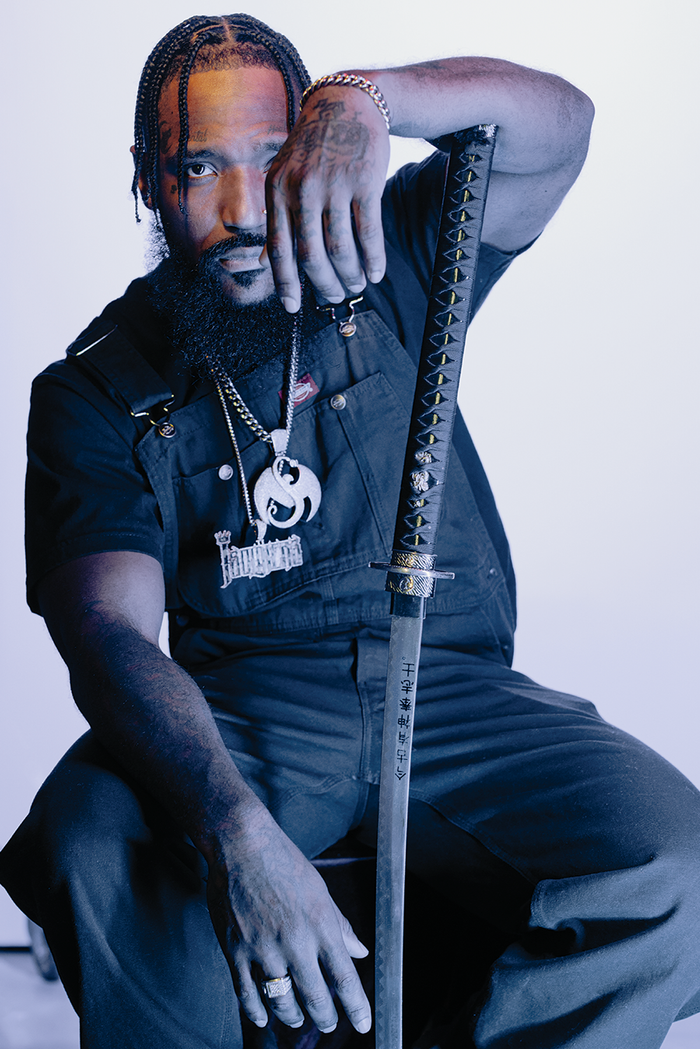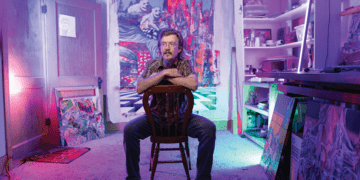King Iso didn’t just stand out because he had just become the second Black person in the coffee shop, the first being me. He commanded attention due to his calm and welcoming aura. Rap music has a connotation of being a violent medium, but when Johnny Cash sang, “I shot a man in Reno just to watch him die,” that was somehow more folksy than a mirror to society. Rap is always viewed through a different lens.
Iso, though, uses rap to explore issues typically not associated with the genre. Childhood trauma, mental health struggles, suicidal depression—those are the heavy themes with which the rapper grapples.
More humble than a Buddhist monk and as cheerful as Santa Claus, the 34-year-old rapper, who was born Tarrel Gulledge in Omaha, manages his mental health struggles through musical alchemy. After generating millions of streams and having every music venue in which he performs heaving with energy, Iso decided to issue a call for healing to troubled generations. In late October 2023, he debuted one of his most personal and critically-acclaimed albums, simply titled, “iLLdren.” He produced and collaborated with producers and artists like Tech N9ne and Matt Phoenix for the release, splitting the album into three concepts: Baby Blues, Teen Trauma, and Adult Adversity. He dedicated the latter to his young son, Andreas, telling the story of his level one autism diagnosis and experience.
Tracks are intensely personal. In “Nightmare,” Iso opens up about his own struggles: “One day I’ll wake, one day I’ll pray / One day I’ll wake up from this nightmare.” The track “Way You Are” speaks to his son’s diagnosis, as well as others “on the spectrum, or dealing with autism,” creating an anthem for them that avers: “You are not sick. You are fine just the way you are.”
Those kinds of words carry power, especially in a genre not often considered a platform for promoting mental health.
Iso’s lyrics have resonated with his fans, or “Isoldiers.” One heartfelt comment under the video for “Way You Are” on YouTube stated: “I love your music, Iso. I’m 30 and autistic and super depressed. Your music has helped me so much. I don’t know how many hours I’ve spent memorizing your lyrics. Not only are they super relatable to me, but they are fast enough to engage my neurodivergent brain. And your speed and unique flows are unmatched. Thank you.”
Another added, “Aside from the beautiful message in the song, can we please APPRECIATE THAT DROP! He always has these crazy build ups and the greatest drops with flows to match and this one was fire.”
V13 Media critic Aaron Willschick hailed the autobiographical release as “one of the most powerful albums of the year.” He went on to write, “With this album, King Iso proves that he’s not just a rapper; he’s a modern-day bard whose tales are as enlightening as they are entertaining.”
Iso remains humble about such effusive praise. “We have to speak life over ourselves. When you have moments when you don’t understand something, give yourself protection, awareness, and love to know that bad moments don’t define you,’” he reflected. “On the front of the album art you can see the words, ‘You are not your childhood trauma.’”
Iso, indeed, is so much more. His discography is a road map of pain and growth. His six albums weave a lyrical narrative about surviving an upbringing beset by mental and physical obstacles, suicide attempts, incarceration, and homelessness.
“Before I was able to put what I felt into a song format, I used to journal. I would take my mom’s big yellow legal pads and write poetry. I got introduced to hip-hop in ’93,” Iso said. “I would write down the lyrics to my favorite songs and try to emulate their cadences to write down what I was feeling.”
Justin Strawstone, Iso’s tour manager, spoke with me over the phone. He practically spilled out of the receiver, the positive energy he gave not only for King Iso but everyone under the umbrella of his company, Nice Enough Entertainment. “I’m not a Strange Music guy, I’m a King Iso guy,” he enthused.
Strawstone told me how he and Iso got to know each other through Omaha’s rap-battle scene and developed mutual respect for one another. When they met some years after, it felt natural to work together. “We did 260 shows in 2023, and we’re currently building his ‘iLLdren’ tour for next spring,” he said. “The music King Iso makes is a heavy undertaking; it’s a precious burden. His fans have gone through similar or more challenging experiences. It can be a lot to take on. I hope he looks after himself.”
As Iso removed his glasses to clean them, he revealed tattoos above his eyebrows: on the right, “mental;” above the left, “health.” They are a message to the people who meet him or happen to glance at him in passing. He isn’t a billboard; he’s putting himself into the thick of it, with V.I.P. sessions during his tour and being a present father. He understands who he is and how he’s perceived.
“I finished an all-ages show in Tempe, Arizona, there was this little girl—had to be about 5 or 6—and she was waiting with her mother, and I stopped and asked her: ‘What do you want to be when you grow up?’ She said: ‘I want to be like you when I grow up.’ That was a mouthful. All I could think about was all the horrible stuff I had done, but what she sees is the hero, the leader, the advocate for mental health. I don’t want her to think I’m perfect or anything. I just want to be responsible.”
After he spoke those words, it was clear that not only is he a king, but a big brother of sorts to the world as well. “King Iso has openers for his shows, and he doesn’t have to do that,”
Strawstone shared. “He remembers being homeless and hungry, artistically and physically. He gives people who were like him a shot.”
Strawstone shared. “He remembers being homeless and hungry, artistically and physically. He gives people who were like him a shot.”
This journey is what led the rapper to create “iLLdren” and spaces for conversations around mental health for all ages.
“You can’t heal until you feel. I put down the drugs and alcohol, and a lot of my childhood trauma started to pop back up,” Iso shared. “I checked myself in a mental health facility to get a reset. When I got in, there were so many children—15, 16—babies. They speak about themselves as if it’s over, that they’re always going to be sick, and not just the children, but people of every age. ‘iLLdren’ is a gateway to a thought process; this album is about running towards what triggers us.”
Iso paused and issued this decree: “Have those uncomfortable conversations with yourself and the people in your life. You will feel better when you do.”
The King has spoken.
Follow King Iso on Instagram @therealkingiso.
This article originally appeared in the March/April 2024 issue of Omaha Magazine. To subscribe, click here.
This article originally appeared in the March/April 2024 issue of Omaha Magazine. To subscribe, click here.

King Iso
Photo by Bill Sitzmann.













